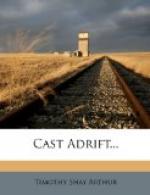The man was on his feet by this time, with his hand in his pocket, from which he drew a number of pennies. These he counted over carefully twice. The number was just ten. If there had been only himself to provide for, it would not have taken long to settle the question of expenditure. Five cents at an eating-shop where the caterer supplied himself from the hodge-podge of beggars’ baskets would have given him a breakfast fit for a dog or pig, while the remaining five cents would have gone for fiery liquor to quench a burning thirst.
But another mouth had too be fed. All at once this poor degraded man had risen to a sense of responsibility, and was practicing the virtue of self-denial. A little child was leading him.
He had no toilette to make, no ablutions to practice. There was neither pail nor wash-basin in his miserable kennel. So, without any delay of preparation, he caught up the broken mug and went out, as forlorn a looking wretch as was to be seen in all that region. Almost every house that he passed was a grog-shop, and his nerves were all unstrung and his mouth and throat dry from a night’s abstinence. But he was able to go by without a pause. In a few minutes he returned with a loaf of bread, a pint of milk and a single dried sausage.
What a good breakfast the two made. Not for a long time had the man so enjoyed a meal. The sight of little Andy, as he ate with the fine relish of a hungry child, made his dry bread and sausage taste sweeter than anything that had passed his lips for weeks.
Something more than the food he had taken steadied the man’s nerves and allayed his thirst. Love was beating back into his heart—love for this homeless wanderer, whose coming had supplied the lost links in the chain which bound him to the past and called up memories that had slept almost the sleep of death for years. Good resolutions began forming in his mind.
“It may be,” he said to himself as new and better impressions than he had known for a long time began to crowd upon him, “that God has led this baby here.”
The thought sent a strange thrill to his soul. He trembled with excess of feeling. He had once been a religious man; and with the old instinct of dependence on God, he clasped his hands together with a sudden, desperate energy, and looking up, cried, in a half-despairing, half-trustful voice,
“Lord, help me!”
No earnest cry like that ever goes up without an instant answer in the gift of divine strength. The man felt it in a stronger purpose and a quickening hope. He was conscious of a new power in himself.
“God being my helper,” he said in the silence of his heart, “I will be a man again.”
There was a long distance between him and a true manhood. The way back was over very rough and difficult places, and through dangers and temptations almost impossible to resist. Who would have faith in him? Who would help him in his great extremity? How was he to live? Not any longer by begging or petty theft. He must do honest work. There was no hope in anything else. If God were to be his helper, he must be honest, and work. To this conviction he had come.




